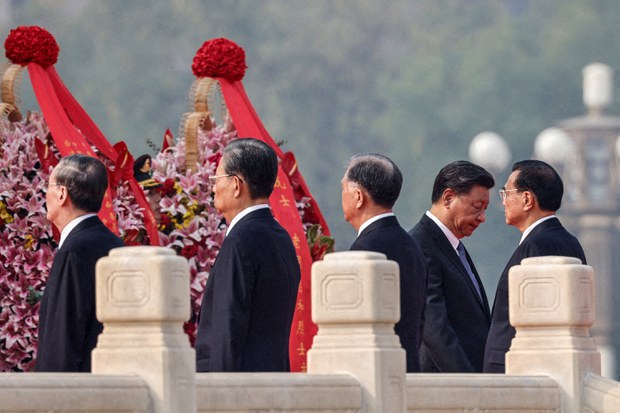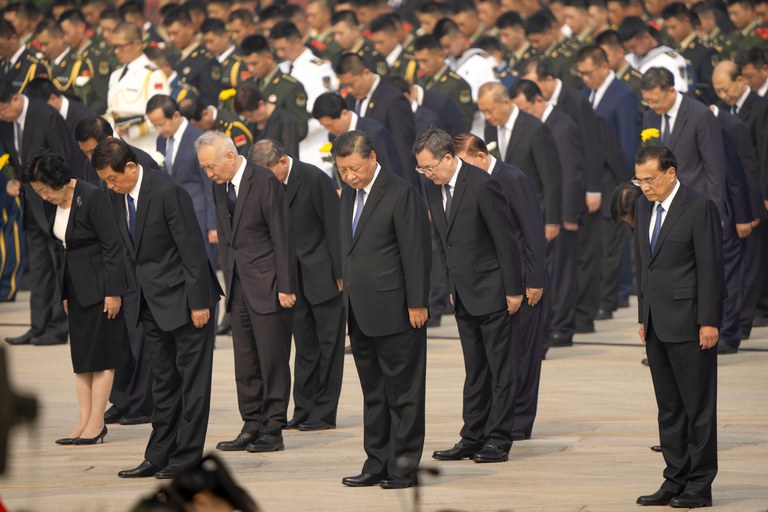China’s top leadership pays respects to heroes of revolution amid citywide clampdown
Share

Chinese leaders, including President Xi Jinping [second from right], lay wreaths on Tiananmen Square to mark Martyrs’ Day on the eve of the National Day in Beijing, China, Sept. 30, 2022.
Ruling Chinese Communist Party (CCP) leaders visited a shrine to revolutionary martyrs on Beijing’s Tiananmen Square on Friday, kicking off official celebrations ahead of the Oct. 1 National Day.
Police set up roadblocks on major thoroughfares around the area, and shut down two nearby stations on Beijing’s subway, amid an ongoing operation that will force critics of the regime and migrant workers from out of town to return home ahead of the CCP’s 20th National Congress, which opens on Oct. 16.
CCP leader Xi Jinping, who will seek an unprecedented third term in office at the party congress, led the members of the all-powerful Politburo standing committee, which bowed in respect at the Monument to the People’s Heroes and laid floral tributes at the shrine in a 20-minute ceremony marking Martyrs’ Memorial Day on Friday, before attending a banquet at the Great Hall of the People.
Beijing rights activist Ye Jinghuan said major boulevards on both sides of Tiananmen Square were closed to traffic ahead of the ceremony, while trains weren’t stopping at Tiananmen and Qianmen subway stations.
“It’s not just the subway — the two streets on the east and west sides of Tiananmen Square [Nanchizi and Nanchang Street] are also blocked off,” Ye told RFA.
“They have also changed the bus and trolleybus routes, so that the No. 1, No. 52 bus and any others routed down Chang’an Boulevard aren’t stopping either,” she said.

Ordinary people put out
Ye said the closure of the stations would greatly inconvenience families hoping to spend the National Day sight-seeing around Tiananmen and the Forbidden City, or shopping at the nearby Wangfujing shopping district.
“Elderly people and kids won’t be able to go, because they would need to get off at Dongdan or Xidan on the subway, then walk to Tiananmen Square [about 2-3 kilometers away],” she said.
Jiangsu-based current affairs commentator Zhang Jianping said the government expects ordinary people to pay the price for their security and convenience.
“They’ve been talking about governing the country according to the constitution and the laws for so many years now,” Zhang told RFA. “But the general public still wind up paying the price for their convenience and ease of travel.”
“I’m not sure if that constitutes the rule of law.”
The ceremony comes amid an ongoing mass operation in which police officers are being put under pressure to make as many arrests as possible, sources have told RFA.
Officials from the ministry of public security said on Tuesday they had arrested more than 1.43 million “suspects” nationwide in a mass “stability maintenance” operation.
“There is no doubt that this is all part of the stability maintenance controls linked to the 20th National Congress,” Zhang said. “There’s no controversy about that.”
A hard time
Ye said any attempt to visit Tiananmen Square for sight-seeing now has to run the gauntlet of multiple security scans and ID checks, with anyone flagged as a potential threat to “stability” sent straight to the nearest police station.
“[Anyone flagged] as a person of interest with a red or yellow label is immediately sent to the police station,” Ye said. “You even have to do ID checks if you go there by bicycle.”
“We haven’t been there for years,” she said.
The “stability maintenance” period will intensify between Oct. 8 and 26, Beijing police have told rights activists in the city, often ordering them to leave town, or escorting them under surveillance to tourist resorts elsewhere, sources have told RFA.
“We must leave Beijing on the 8th,” one activist, who declined to be named, said on Friday.
Beijing resident Wang Xia said security is tight everywhere in the city.
“Security is very tight in Beijing right now,” Wang said. “As soon as you arrive in Beijing by bus or train, you have to [line up] for ID card checks, one by one,” Wang said. “The focus is on rights activists and petitioners, whom they regard as a threat.”
“They are detaining all of them … they give people a hard time. The whole of society is just a big prison right now,” Wang said.
Translated and edited by Luisetta Mudie.








